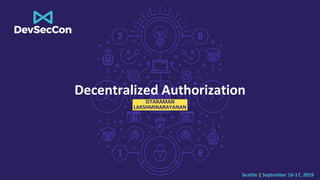
DevSecCon Seattle 2019: Decentralized Authorization - Implementing Fine Grained Access Control in a consistent manner using OPA
- 1. Seattle | September 16-17, 2019 Decentralized Authorization SITARAMAN LAKSHMINARAYANAN
- 2. Seattle | September 16-17, 2019 Am I Authorized to speak about this topic? OR whoami ? • Subject – Sitaraman ( Ram) Lakshminarayanan • Resources – I work for Pure Storage as Sr Security Architect • Actions – Author-Web Services Security, Co-Author ASP.NET Security • Other Attributes: Twitter: @Lsitaraman , Exp : 20 Years, Can speak Role Based and Fine Grained Authorization semantics among other things.
- 3. Seattle | September 16-17, 2019 Why talk about Authorization here? • Security Teams are always in the mix between – Developers / Operations / Customers/ PM’s. • Let’s not just ask questions, provide solutions. • Just pointing in the right direction is a big favor to developers.
- 4. Seattle | September 16-17, 2019 What is Authorization? Subject – User / Application Resource – Web App, API, or any feature of your App Action – Read , Write, Delete, Approve, Deny, etc. Is the User (Subject) allowed to Perform the said action on a Resource?
- 5. Seattle | September 16-17, 2019 Role Based Access Control – one form of AuthZ Role Resources Actions Group
- 6. Seattle | September 16-17, 2019 Developer’s view of Implementing RBAC If Role == “Manager|Admin” { return True; } Something along those lines.. - Rules are hard coded in the code. - Implementation varies between Teams / Stack
- 7. Seattle | September 16-17, 2019 Dev-Sec-Ops Developer- Implements AuthZ logic Security – wants to verify if you can enforce “need to know” basis / Least privilege. Ops – wants to make sure everything is running / deployment doesn’t take hours, etc.
- 8. Seattle | September 16-17, 2019 When Security Team reviews the code/deployment? Security: Can I change what this Role- Manager or Admin can do ? Developer : ?? Why?? Security: 1. Our Policy 2. Its too high of privileges for Role- XYZ ( e.g. Manager) 3. Separation of Duties
- 9. Seattle | September 16-17, 2019 How would a Developer Re-design RBAC? Role Permission Group Permission Resource+Action
- 10. Seattle | September 16-17, 2019 Back to Security Security – Super Excited !!.. At least I was when I did this in 2004
- 11. Seattle | September 16-17, 2019 Operations – How to deploy this in Production? On Call person who has to deploy/ debug Apps permissions have to 1. Add Resources / Permissions 2. Create new Roles 3. Map Roles to Permissions Its usually 10’s of pages of doc per Application. Listen to talk about Security & Dev Ops by @IanColdwalter BSidesNOVA 2019 https://www.youtube.com/watch?time_continue=2&v=OlAFuiDCqbM
- 12. Seattle | September 16-17, 2019 Operations Person? Imagine managing/configuring Roles, Permissions, Resources for multiple apps
- 13. Seattle | September 16-17, 2019 Did Centralized AuthZ model work? 1. Hard coded apps to centralized authorization services 2. App developers have to understand AuthZ Service to better take advantage of centralized service. 3. Changing permissions/policies is not easy 4. It actually slows down time to deploy.
- 14. Seattle | September 16-17, 2019 What If? 1. We externalize authorization from code 2. Provide developers full control of how they want to write their AuthZ Rules 3. Give Security Teams option to customize the authZ rules/policies 4. Does not Involve too much operational overhead 5. Reduces time to deploy? 6. Consistent way to enforce policies across various languages/stack
- 15. Seattle | September 16-17, 2019 Intro to Open Policy Agent Client/App- makes REST API call to get Decisions from OPA OPA – makes Policy Decision – Evaluating Input Data against Policies OPA Policies are written in Rego outside of Code
- 16. Seattle | September 16-17, 2019 OPA and Rego 1. Rego is a query language 2. OPA Policies are written in Rego 3. SQL for Authorization – You write your AuthZ rules in a consistent manner.
- 17. Seattle | September 16-17, 2019 OPA - Example Policy package httpapi.authz subordinates = {"alice": [], "charlie": [], "bob": ["alice"], "betty": ["charlie"]} import input as http_api allow { http_api.method = "GET" http_api.path = ["finance", “salary", username] username = http_api.user }
- 18. Seattle | September 16-17, 2019 OPA – Other benefits • Provides an Interface to get Decision Logs through API / Web Hooks • Provides an option to get Telemetry about OPA itself ( up /down) • Policies can be distributed as Bundles ( Bundles = Rego file, Data file)
- 19. Seattle | September 16-17, 2019 OPA – Interactions from Developer Point of View
- 20. Seattle | September 16-17, 2019 Externalized Policy
- 21. Seattle | September 16-17, 2019 Kubernetes AuthZ model
- 22. Seattle | September 16-17, 2019 Key takeaways • Externalize Authorization from your code – As product / Service • During Security Reviews – ask If Authorization can be externalized from code • Use Open Policy Agent to standardize on how to write AuthZ rules. • Integrate with SIEM for decisions- allow/deny. • Establish a pattern across your Product/Service for consistent authZ. Authorization does not happen without a proper Authentication. Check out– SPIFFE /SPIRE for Secure Introduction of Identities
- 23. Seattle | September 16-17, 2019 Thank You. @Lsitaraman
